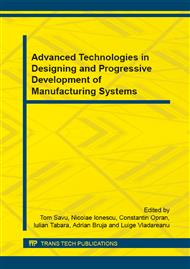p.557
p.563
p.571
p.577
p.583
p.589
p.595
p.601
p.607
Study on Improving the Functional Performance of Linear Motion Systems
Abstract:
In the construction of high performance mechanical transmission with high precision in movement and positioning are used ball screws with preloaded double nuts. Among the factors that influence the performance of these transmissions are friction idle torque and friction load torque. Because, theoretically, the friction idle torque is influenced only by the preload force that loading, the double nut of the ball screw, was experimentally determined dependence of that torque of screw speed. Given the set was determined and exposed in the present work, the relation of dependency, idle friction torque, preload force and screw speed. From the relationship thus obtained can determine the instantaneous friction coefficient of the ball screw, a value that is found in the expression of power lost through friction - default transmission efficiency.
Info:
Periodical:
Pages:
583-588
DOI:
Citation:
Online since:
May 2015
Authors:
Price:
Сopyright:
© 2015 Trans Tech Publications Ltd. All Rights Reserved
Share:
Citation:


